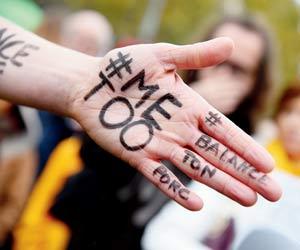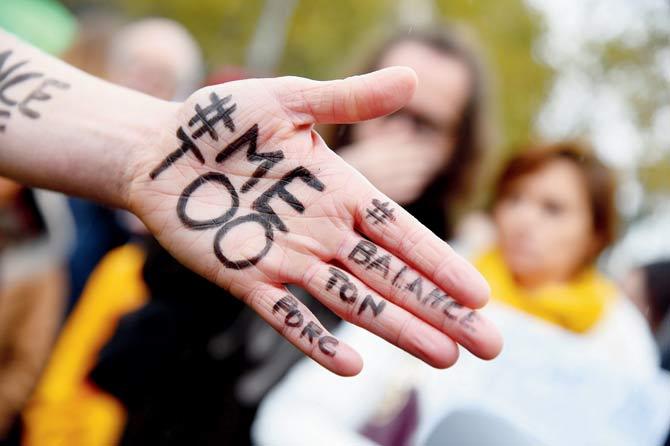Women the world over spent much of last year naming and shaming men who had abused their power. Why didn't that happen here?


The #MeToo campaign on social media platforms attracted some attention, but it was business as usual for industries like entertainment and technology
ADVERTISEMENT
 Indian men can do no wrong. That was the implication for millions of us when confronted with the deafening silence of 2017, in sharp contrast to the voices raised in protest against powerful men in the West. The #MeToo campaign on social media platforms attracted some attention, but it was business as usual for industries like entertainment and technology - both controlled by men, both home to millions of women, and both happy to turn a blind eye to the mere possibility of sexual harassment.
Indian men can do no wrong. That was the implication for millions of us when confronted with the deafening silence of 2017, in sharp contrast to the voices raised in protest against powerful men in the West. The #MeToo campaign on social media platforms attracted some attention, but it was business as usual for industries like entertainment and technology - both controlled by men, both home to millions of women, and both happy to turn a blind eye to the mere possibility of sexual harassment.
There were glimmers of hope in the form of people like Raya Sarkar, a graduate student of law at the University of California who, on October 24, used Facebook to put up a crowd-sourced list of alleged sexual harassers across universities in India and America. Her list was reportedly compiled with the help of students who wanted to warn other young women, and listed crimes ranging from verbal abuse to rape. At one point, it listed 58 academics from 29 Indian educational institutions.
There was predictable outrage, followed by the usual complaints from those who disparaged the list for not having any context or explanation. Some institutions that did condescend to respond to the allegations mentioned a need to follow 'due process' - the two favourite words of Human Resource personnel in our country - and pointed out that their hands were tied because no formal complaints had been filed against those named. They also mentioned the existence of 'internal complaints committees' to absolve themselves. A couple of days after Sarkar put up her list, she mentioned getting death and rape threats.
No one is saying that these allegations against people aren't problematic, because terms like 'collusion', 'intimidation' and 'blackmail' are so easily misused the minute a victim has the temerity to speak up. This is precisely why the global outpouring of voices against powerful figures gained such resonance though, enabling women who had been compelled to stay quiet for decades, some under the threat of legal action, to find the courage to speak up irrespective of potential consequences.
All we had here were a series of #MeToo posts that simply made evident just how widespread the problem was while, ironically, also highlighting how difficult it continues to be for victims to accuse someone without fear of reprisals. Men claimed to be surprised by the scale of the problem, conveniently blaming statistics related to rape crimes for the ignorance, while ignoring the fact that there were reportedly more than 34,600 criminal complaints of rape in 2015 alone, a 40 per cent rise compared to cases registered in 2012.
It is naïve to assume that the film industry and corporate India have absolutely no men abusing their power. The former has suppressed the existence of a casting couch for decades, while the latter continues to maintain a Boys' Club culture that makes it extremely difficult for women who dare to attack it.
In February 2017, a South Indian actress was abducted and assaulted by a gang of men. A popular actor was arrested on the charge of being a key conspirator and, unsurprisingly, granted bail soon after. Under normal circumstances, an incident as shocking as this one would have prompted women from the industry to rise as one in solidarity. The only ones who dared to speak up though - actresses untarnished by the brush of nepotism, obviously - were left to deal with millions of trolls who exist online primarily to harass women.
A week ago, the Bombay police booked a prominent venture investor for sexual harassment and using obscene language, based on a written complaint filed by a Delhi-based woman. These accusations had been made public a long time ago, by a number of women, but the man in question continued to be invited to panels across the country, where his views on technology were sought. He wasn't the only senior figure accused of harassment either, but there were few voices supporting the victims. The deafening silence prompted a female journalist tasked with covering the industry to tweet: 'Our start-up and tech Bros have views on everything from economy to Trump to virtual currencies to biometrics, but not one word to say on a prominent Indian investor being booked for sexual harassment. Almost like there is some Omerta code. Thanks guys [sic]'. Maybe it's just a question of time though. Some of these allegations are a good sign of how nothing can be hidden forever. Maybe 2018 will mark when the luck of some powerful
Indian men finally runs out.
When he isn't ranting about all things Mumbai, Lindsay Pereira can be almost sweet. He tweets @lindsaypereira. Send your feedback to mailbag@mid-day.com
Download the new mid-day Android and iOS apps to get updates on all the latest and trending stories on the go
 Subscribe today by clicking the link and stay updated with the latest news!" Click here!
Subscribe today by clicking the link and stay updated with the latest news!" Click here!






